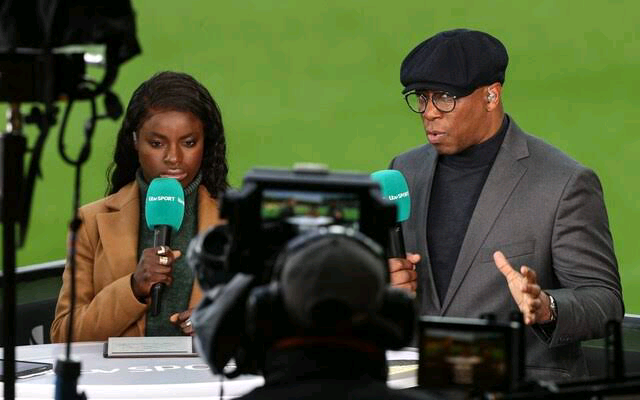Ian Wright has expressed his deep disappointment over recent comments made by Eni Aluko regarding his role in women’s football and stated that he cannot accept her apology.
His response has sparked a broader conversation on gender and equality within the sport.
Aluko, in a recent interview, suggested that men like Wright should be more conscious of the opportunities they receive in the women’s game, adding that female broadcasters should not face barriers to progression.
During her appearance on BBC Radio 4’s Woman’s Hour, the former England forward said, “I’ve worked with Ian for a long time and think he’s a brilliant broadcaster. But I believe he’s aware of how much he’s involved in women’s football. I think he should recognize that.”
Aluko’s remarks came amid growing discussions around the need for greater inclusion and support for women in football, both in terms of media representation and playing opportunities.
Many fans and pundits have weighed in, expressing differing opinions on how male figures in football should navigate their roles in the women’s game, especially given the sport’s historical marginalization.
In response to backlash over her remarks, Aluko posted an apology on social media on Friday, writing on Instagram: “It was wrong for Ian’s name to be brought into that conversation, and I sincerely apologize. I’ve known and worked with Ian for many years and have nothing but love and respect for him.”
Despite acknowledging Aluko’s apology, Wright has made it clear that he cannot accept it.
The former Arsenal striker emphasized the need for everyone to address the systemic challenges in women’s football. “I’ve got to say I’m very disappointed by what Eni has said. She knows how I’ve supported her publicly. I’m aware of the conversations she’s had with me and my management. I’ve seen your apology on social media, but I can’t accept it. However, I do want to move past this,” he wrote on Instagram.
Wright continued, stressing that the progress of women’s football should be about collective effort, not individual actions.
He added, “The challenges in women’s football are systemic, and they have been for decades. For 50 years, men held back the women’s game, and it’s going to take all of us to help fix it. I will continue to give back to the game that has given me so much.”
His comments shed light on the ongoing battle for equality and recognition in a sport that has historically been dominated by men.
This exchange has also sparked wider conversations about the role of high-profile male figures in women’s sports.
Meanwhile, Supporters of both Wright and Aluko have expressed differing views, with some siding with Wright, arguing that the systemic issues in women’s football require more than just individual accountability, while others believe that Aluko’s points were valid in drawing attention to the imbalance in opportunities.
The 61-year-old concluded by expressing gratitude to his supporters during what has been a difficult week for him. “I want to thank the fans who have stood by me through this. It’s been an emotional week, but I’m focused on the bigger picture and the changes we need to see in the game.”
Wright’s comments continue to stir debate as both figures remain key influencers in football’s ongoing evolution. With growing recognition of the women’s game, the conversation surrounding how men’s involvement can aid or hinder progress remains ever-relevant.









